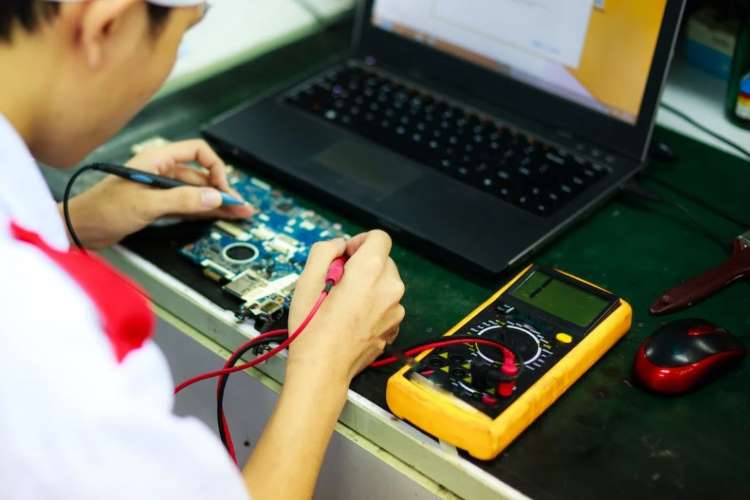
Last week, the government took steps to restrict the import of electronic items, including laptops, tablets, all-in-one personal computers, ultra-small computers, and servers. This move aims to bolster domestic manufacturing as part of the PLI scheme. However, the implementation of the restrictions on tech imports has been postponed until November 1. Going forward, any entity or company intending to bring laptops and computers into the country for sale will need to obtain government permission or a license for their inbound shipments, as stated in a notification by the Directorate General of Foreign Trade (DGFT).
This curbs on tech imports coincides with the government’s renewal of the production-linked incentive scheme for IT hardware. The deadline for applying for these production-linked incentives in this category is August 30. Currently, a significant portion of these goods are imported from countries like China and Korea, with China alone accounting for 75% of India’s $5.33 billion imports of laptops and personal computers in the 2022-23 period.
READ | Govt strives for competition in telecom amid looming duopoly
Logic behind curbs on tech imports
Over the past few years, India has experienced a substantial surge in imports of laptops, and computers. From April to June this year, the import of electronic goods jumped from $4.73 billion to $6.96 billion compared to the same period last year. These imports constitute 4-7% of the overall imports in the country. Notably, China holds a significant share in seven categories restricted for imports. In April and May of 2023, India’s tech imports from China in these restricted categories were valued at $743.56 million.
The largest portion of tech imports falls under the category of personal computers, which includes laptops and palmtops. China dominates this segment, accounting for roughly 70-80% of the imports in personal computers and laptops.
While the government’s imposition of curbs on tech imports signifies a protectionist stance, it emphasizes that the primary motivation is to safeguard the citizens’ security. Some hardware may pose security risks and compromise sensitive and personal data.
For consumers, this move implies potential price increases for everyday devices, depending on how the licensing norms are enforced. Consequently, prices of current laptops, computers, MacBooks, and Mac Minis in the Indian market might rise, as sellers may no longer provide additional discounts. In the short term, prices of laptops, tablets, and computers could rise, as companies pass on the costs of complying with the new regulations to consumers. However, if companies shift towards domestic assembly, prices could see a significant reduction in the long run.
At present, major Original Equipment Manufacturers (OEMs) like Apple, Dell, HP, and Lenovo import devices. These imports, whether through e-commerce portals, post, or courier, will now be subject to applicable duties. Imports under baggage rules are currently exempt from these restrictions.
Remarkably, companies like Reliance are poised to benefit from this move. Reliance, led by Mukesh Ambani, has made strides in the electronics segment with the recent launch of the JioBook in the country. While Reliance also relies on imports from China, obtaining licenses remains relatively straightforward for them.
The newly introduced restrictions could impact giants like Apple, Samsung, and Acer, potentially compelling them to enhance manufacturing and assembly within India. These companies presently rely heavily on imports from other countries. They now face a choice between halting gadget imports to India or scaling up local manufacturing. Other affected companies could include PC manufacturers such as Lenovo, HP, Asus, Acer, and Samsung.
Following the government’s announcement, shares of local electronics contract manufacturers like Amber Enterprises India Ltd., Dixon Technologies India Ltd., and PG Electroplast Ltd. experienced a rise.
The pitfalls of trade protectionism for the economy
In the 1990s, the Indian economy embraced liberalization, privatization, and globalization as key goals. The government allowed domestic firms to import advanced technology, thereby enhancing efficiency. The aim was clear: rectify the adverse impact of repressive policies like quotas and high tariffs, which were intended to curb imports and needed correction.
The import restrictions are significant from a trade policy perspective. They mark a significant departure from India’s previous policy of open trade and could set a precedent for other sectors. This could lead to increased protectionism in India and could make it more difficult for foreign companies to do business in the country.
Considering this backdrop, the current move could potentially lead to adverse consequences, setting a precedent for similar licensing requirements in other sectors. This might stifle economic activities and undermine the progress achieved since the reforms of 1991. As the world’s fastest-growing economy, India’s decisions, such as these, have far-reaching implications for business confidence. This choice could also result in immediate disruptions, causing supply shortages and driving up equipment prices. Nonetheless, the government has its sights set on long-term gains, and its success remains to be seen.
Anil Nair is Founder and Editor, Policy Circle.


